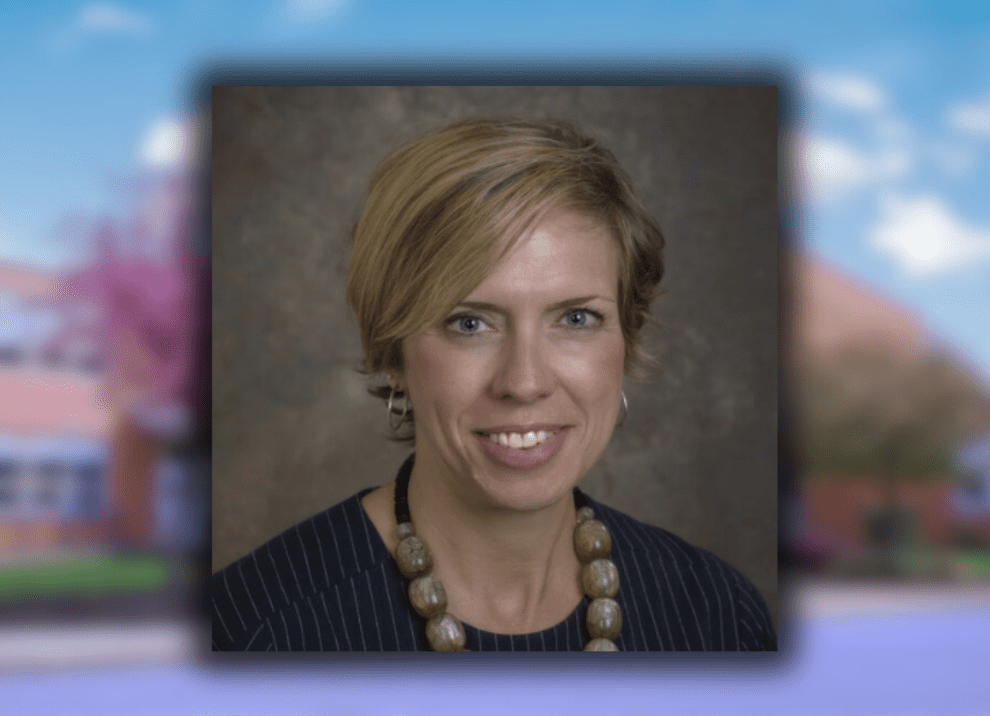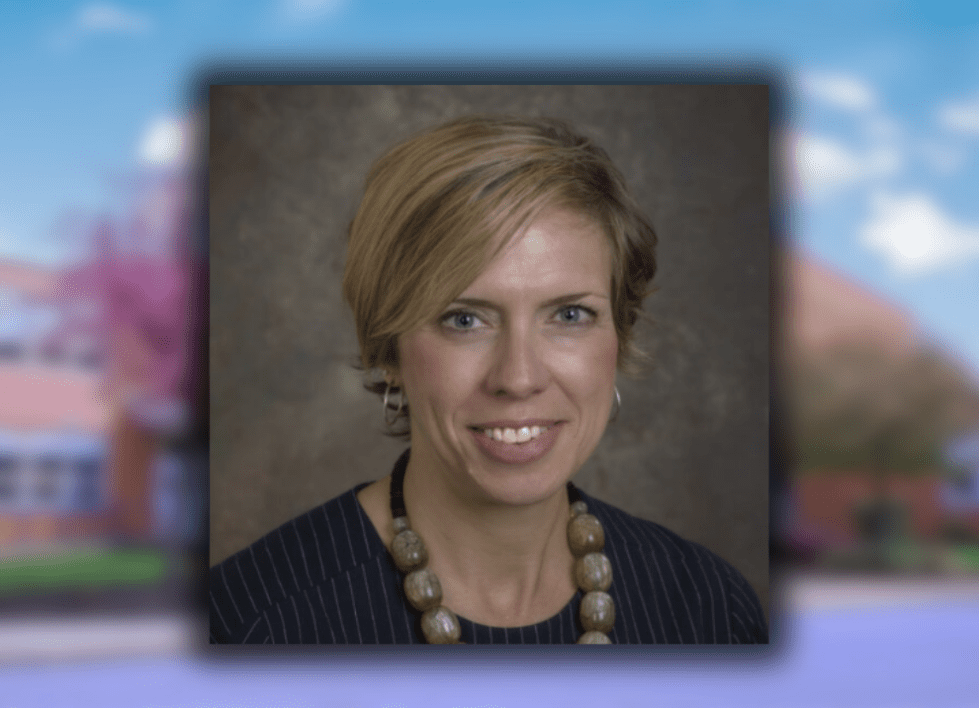
Amy Trauth, a candidate for the Christina School District Board of Education, answered a series of questions on education topics during a public forum Monday night.
A series of get-to-know school board candidate forums kicked off Monday night with Christina School District, which has two people vying for one open seat.
Hosted by a slew of education and social advocacy groups, the virtual forum is one of four throughout the next two weeks.
Matt Clifford, one of the candidates, declined to participate, so the questions on hot-topic issues in education were solely directed towards Amy Trauth.
Trauth’s background
As a faculty member of the University of Delaware for nearly a decade,Trauth worked in virtually all school districts at some point, assisting science educators to learn and enact new state standards.
A parent of two children who have graduated from First State public schools, she describes herself as a fierce advocate of public education.
As an educator, she’s worked as a middle and high school science teacher.
Trauth earned her undergraduate degree in biological sciences from Northern Kentucky University, a masters in plant biology from Arizona State University and a doctorate in science education from Indiana University.
She’s also taught courses in education and supervised aspiring teachers in their student teaching placements.
Now, she works for a nonprofit, the American Institutes for Research, as an education researcher. That’s the group that recently published a landmark report on the state’s failing education funding formula.
RELATED: Adding $500M+ more into education likely matter for legislature
If elected, Trauth wants to serve the community and support the district in meeting the needs of students and educators.
Role of school board members
After listing specific job duties of a school board member, Trauth said her role would be to help district administration make the best district-level decisions.
“The school board, of course, should balance the interests of the local community by providing a high-quality, equitable and inclusive education for all the students who attend,” she said.
School board members should be supportive of district operations, she said, but should not interfere.
“The school board is not the superintendent,” she said. “The school board should not undermine, threaten or intimidate the superintendent or district administrators or educators who work directly with students.”
Low proficiency scores
The sharp decline in test scores happened over multiple decades, and the fix for that is really slow work with no quick fixes, Trauth said.
Some of the issues with poor outcomes can be mitigated by high-quality, positive and affirming classroom environments, and high-quality instruction, she said.
As a school board member, she believes her job would be to help administration make smart decisions on where to spend their professional learning dollars and to refine the best teaching practices for educators.
She wants to see high-quality teachers who have access to strong instructional coaching.
“There needs to be a system of engaging in continuous improvement through the use of program data,” she said. “Which means we’re using not just standardized tests, which are convenience measures, but we’re also using classroom data to track how students are doing.”
Implicit bias and diverse students
Implicit bias exists within everyone, Trauth said, and brains are wired to see confirmatory evidence that aligns to one’s own beliefs and values.
She doesn’t know if implicit bias exists more in Christina than other districts, but she said it’s crucial to listen to the perspectives of her peers.
“I plan to advocate for practices that reduce both explicit and implicit bias in our schools,” she said. “I plan to do so based on data, not anecdotes or feelings.”
She said students in unique demographics – special education, disabilities, English language learners – must receive equitable access to an excellent education.
This starts with allocating resources properly, she said.
“The goal of course, is to create an inclusive school culture where every student feels valued and empowered to succeed and educators have the tools and resources to do this,” she said.
She applauds Delaware for tracking data on the discrepancy of discipline referrals and suspensions for special education students and Black and Brown students.
While many other state’s don’t track this, she said she presumes the same would hold true across the nation.
“The district should also make it a priority to review their disciplinary data at the school and district levels to identify positive or negative trends and where they need to take action steps to address the disproportionality and rates of discipline,” she said.
Proactive steps taken to support a positive school climate are important, she said, as well as supporting students’ social and emotional development and supporting teachers in meeting students’ academic behavioral needs.
She would like to lean into the work of school counselors, psychologists and social workers to help mitigate the issue.
Family involvement
Trauth is a big supporter of broadcasting school board meetings virtually so busy parents can have the opportunity to learn what’s going on in the district – most districts do livestream their meetings at this point.
“Any way that a school board and the school district can open channels of communication with the community as a veritable good,” she said, “I do think that the virtual option to attend allows a wide variety of stakeholders to access school board business.”
Guns
Growing up surrounded by guns, as her father was an avid hunter, Trauth acknowledged the rights guaranteed by the United States Constitution.
“But that doesn’t mean that you get to bear them or keep them in schools, they don’t belong in schools period,” she said. “Arming teachers, constables and school resource officers won’t keep kids safer. In fact, it’ll do the opposite. No one in school buildings or on school grounds should have a firearm or any other weapon.”
Her preference would be that society has less guns, but she realizes this isn’t reality, as 40% of American adults live in a household with a firearm.
Making sure that guns are secured and locked is pivotal.
“The idea of parental rights also extends to the idea of parental responsibility,” she said. “Parents are responsible for keeping their children safe, and this extends beyond the push to ban books or contents that some parents might find personally offensive. Parents should be held accountable for ensuring safe storage of weapons, including guns so that students can not put them in their backpacks and bring them to school.”
Book-banning
“Parents and guardians of children who attend our schools have the right to express their views and be heard at school board meetings,” she said. “Education is not just about learning how to read, write and do math. It’s about preparing students to be informed and engaged citizens.”
Shielding students from certain topics or viewpoints out of fear of controversy or disagreement only serves to promote ignorance within the community, she said, as education is about confronting challenging ideas and encouraging debate and empowering students to think critically about the world around them.
“Exposing students to a variety of viewpoints, even those that may seem controversial or challenging, is essential for cultivating active participation,” she said. “In the democratic society, curriculum decisions in public education should be guided by educational experts who understand pedagogy and the developmental needs of students.”
Curriculum should support students’ learning, she said, not be dictated by personal beliefs or preferences.
LGBTQ+ students
Trauth first pointed out that Christina School District has a policy in place that affirms and protects the safety, security and inclusion of our LGBTQ+ students.
“I support those policies, and as a school board member I would support the district in enforcing these policies to protect LGBTQ students and staff, per state and federal law,” she said.
Every student, regardless of their identity or status, has a right to quality education, she said.
“We live in a democratic society, and democracy requires inclusivity and school,” she said. “This is not just a moral imperative, but a practical necessity.”
Public school serves as a societal cornerstone, she said, that shapes the minds and characters of future generations.
“It’s essential that schools reflect the diverse tapestry of humanity and provide an environment where everyone feels valued, respected and supported,” she said. “This includes LGBTQ students and staff.”
Mental health support
Continuing the initiatives that began during the COVID-19 pandemic related to social emotional learning is essential for supporting students, she said, who were set back in a fully online forum of school.
It’s important to have positive behavioral interventions when needed, and cultivate a school environment that feels safe and welcoming.
Just as it’s needed to support student mental health, the mental health of school staff is crucial too, especially with the national teacher shortage and many educators voicing that they’re stretched too thin and have too many duties.
“I’m always an advocate for competitive educator compensation,” she said. “I think that our teachers deserve incremental increases to account for the cost of living.”
Referendum
Trauth said there needs to be reform in the way that referendums are an integral part in Delaware’s funding system.
“I’m hopeful that the legal settlement that occurred in 2020 that required counties to reassess property taxes after 40 years will be one stop among many that will help our schools be sustainably and equitably funded over time,” she said.
To avoid constant referendums, she believes there should be automatic increases in the base funding from the state for operating expenses each year to keep up with rising costs and inflation.
This includes ongoing reassessments of property taxes, reform in the laws governing school funding, and updating the equalization formula that has not been updated since 2009.
School choice
School choice is ingrained in Delaware’s school systems, she said, but the state has an obligation to fund all schools, charter or district, appropriately and adequately and also hold them accountable for the quality of education just like they do with public school districts.
“My view is there needs to be more transparency and accountability in the funding that charters receive both from the state and from the districts from which they draw funds,” she said. “Charters get to play by more flexible rules right now than regular public school districts do with regard to funding and this fact has placed them unfortunately at odds with their local public school districts.”
Here are the remaining school board candidate forums:
- Appoquinimink School District: Tuesday, April 23 from 6 p.m. to 7:30 p.m.
- Red Clay Consolidated School District: Tuesday, April 30 from 6 p.m. to 7 p.m.
- Colonial School District: Wednesday, May 1 from 6 p.m. to 7 p.m.
Register for the meetings here.

Raised in Doylestown, Pennsylvania, Jarek earned a B.A. in journalism and a B.A. in political science from Temple University in 2021. After running CNN’s Michael Smerconish’s YouTube channel, Jarek became a reporter for the Bucks County Herald before joining Delaware LIVE News.
Jarek can be reached by email at [email protected] or by phone at (215) 450-9982. Follow him on Twitter @jarekrutz
Share this Post




